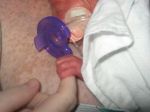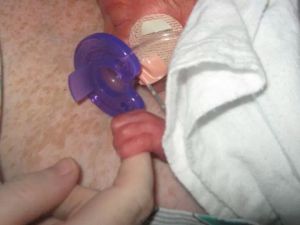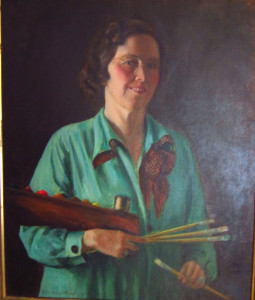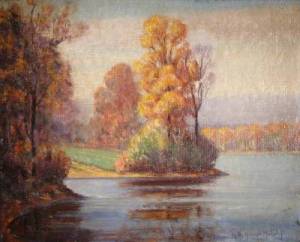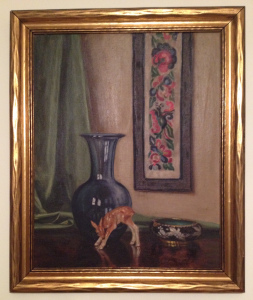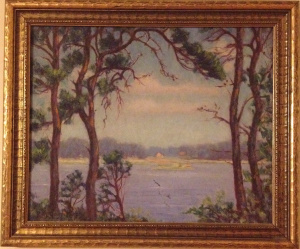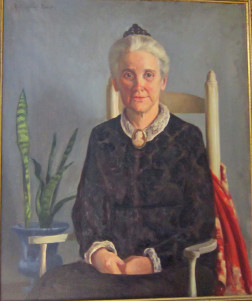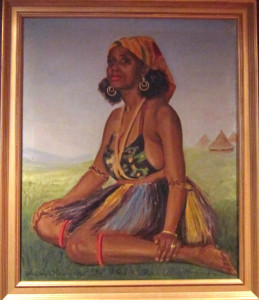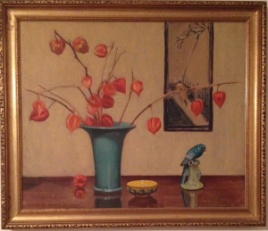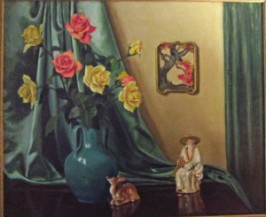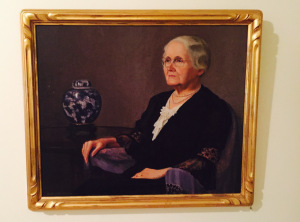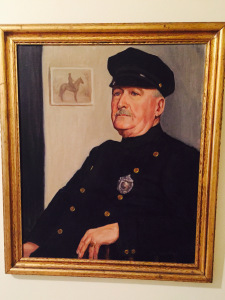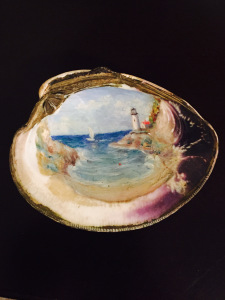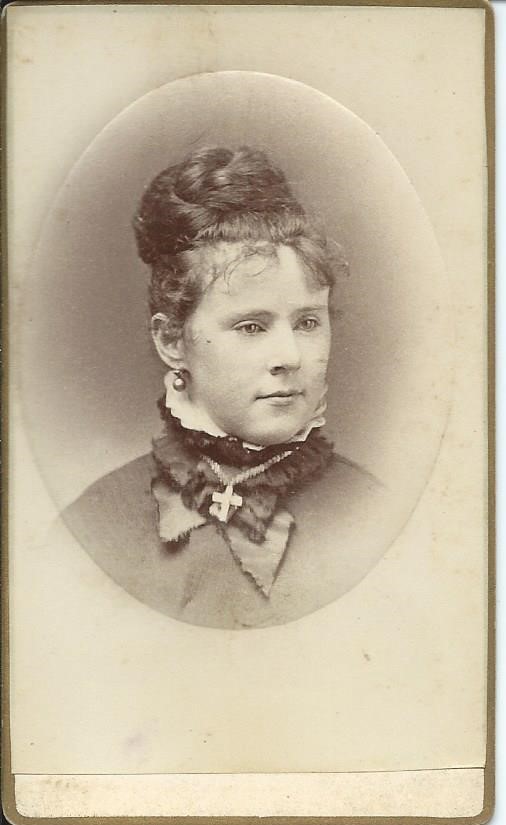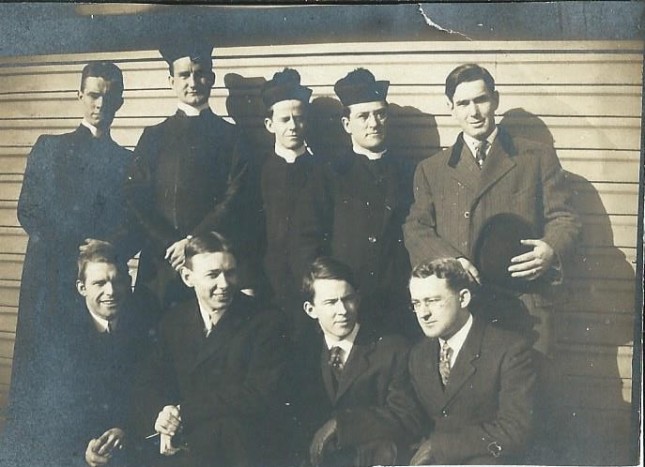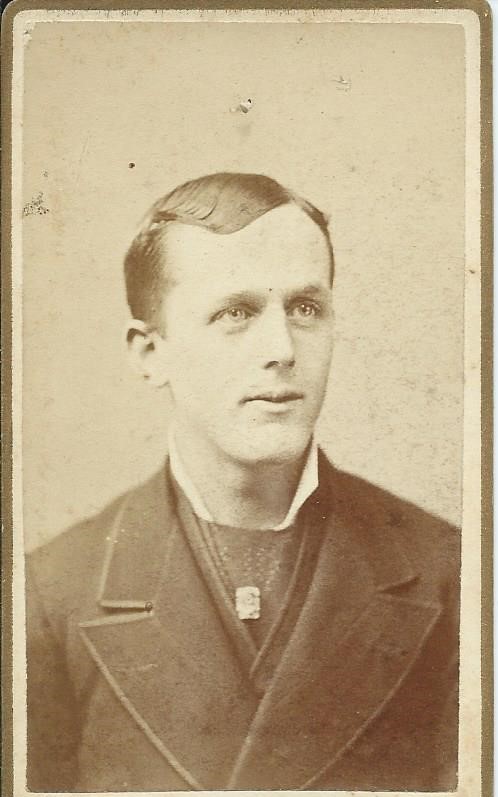College grandeur had departed. I was installed as housekeeper in a doctor’s house. My freshman homesickness held no candle to this awful emptiness that faced me now. Father and Mother were out of the house, or shut up in their offices all day. Joe was at Harvard. No companionship could be found in the kitchen. It was the era of incompetent Portuguese women who scarcely knew a ladle from a spoon. The house was enormous to keep swept and dusted, for father had just built a new one, a 24-room house of three stories with each room the size of a pioneer cabin. The D.A.R.’s frowned at it, for father had torn down a lovely old landmark with warming closets and Holy-Lord doors, to make way for a pompous affair of granite base with twin wooden towers rising on either side of a massive mahogany door. The old house had been set back from the street, as the City Hall had been, next to it. Then the City Fathers had cut down the beautiful elms, had torn up the emerald lawns, and had put on an enormous granite front. To match this monstrosity Father built a granite front, too, and set it on the sidewalk. Mother said she liked to be able to sit at her front window and look down Main Street. As a matter of fact, we always looked instead at the First Parish Church across the way, its lovely Norman tower half hidden in the elms, its stone-walled churchyard velvet green in the summer, and in winter white as the fields of heaven. Our house followed no special architectural design. It was a composite of father’s daydreams and some of his nightmares. Mother had little to say. It was father’s house. He designed it with a noble Jacobean living-hall, upstairs and down, paneled in the choicest of red oak above which were soft green plaster walls stenciled with heraldic device. The huge doors boasted egg-and-dart moldings and the fireplaces in every room ornamental scrolls which father had laboringly had drawn to scale. The office-hall and the dining-room papers were dark leather affairs imported from a little town in Magland. The music-room, with a new stainway grand, especially for me, was paneled in oak with landscaped burlap showing castles and moats. The light fixtures were solid brass, antiques and fitted with candles. My bedroom was baby blue plaster with a wide border of hand painted apple blossoms. But father’s pride was the twelve foot high cemented cellar “where he could walk upright”. Most of the cellars of that time were entered crouching.
His other special joy was the billiard room in the attic. Beside the billiard table there was a tower-end, made to represent an Indian wigwam. How father’s eyes would gleam when he took friends up to see that room with seven windows. Every window in the house was a different size, of heaviest plate glass. The curved ones cost fifty dollars to replace when pierced later by a small boy’s 3.3 gun. One by one the window-cords broke and no carpenter could be found to get them to run up and down smoothly again. The one mean room was the kitchen. At a time when kitchens were big enough to house a couple of automobiles, father built one so small you couldn’t swing a cat. He said he was tired of having hired girls feeding an army, and he was going to put a stop to it. I never remember any of our girls entertaining more than one and a half visitors at a time, but that was his idea. He kept the old ice chest, and the old gas stove. Mother sputtered, but it made no difference. This was his house. His offices were rich and dark with handsome Chinese vases on built-in bookcases with doors of leaded glass. Mother’s were light, and from the day she moved in, a welter of disorder. Father’s medicine stood in rows, his bills were in alphabetical compartments, but mother’s medicine bottles and bills were all over the place with bits of cotton and rubber pessaries ornamenting the window sills. Over her operating table hung a huge picture of Grandfather Murphy with his white whiskers painted black. Mother was devoted to Grandfather because, after she was married, he had encouraged her to follow in his footsteps and become a surgeon. Grandfather had been a member of the Royal Academy of Surgeons in Manchester, England, before he had come to Taunton and married Grandmother. I have been told by patients whom he treated with outrageous candor that he was a gentleman of the old school. My only memory of him is his trundling me on his knee while he sang, “Woompshen, woolly woo, woolly, woolly woo.”
The house could have taken all my time, but I was not particularly domestic, so I had long, lonely hours to myself, hours when I used to tramp then miles around the lake, or sew for days with the village seamstress. Mother used to employ a seamstress about six months of the year, and I was rigidly required to help her make my ocean of clothes. Sometimes I would have thirty new dresses a year, of the most exquisite material and the most complicated design. That was the era of miles of braid and tons of ruffled petticoats, with battalions of hooks and eyes, boned bodices, lace fur bellows, and ostrich feather hats. Skirts were cut into innumerable panels, snipped here and snipped there, and sewn together again with cat stitches, feather stitches, fagoting, and whip cords. Every seam was overcast. It was considered slipshod to pink them. Buttonholes were prodigal in number and size. Even tailored coats were made at home, and opera-capes were trimmed with glittering passementerie, when they weren’t heavily embroidered with American Beauty roses. Outside of my high school graduation dress which boasted 250 yards of lace hand sewn on silk net, the noblest creation I ever had was for Harvard Class Day. The dress was on pinkish tan silk completely covered with rosebuds that had to be embroidered with laborious care. The skirt was ten yards round and was supported by four silk under skirts, each with its hand made ruffle. The sleeves were long and the neck was boned. When I donned it and settled in our automobile to be driven to Cambridge, I was as arrogant as Catherine of Russia. My pride, however, was short. On Harvard Bridge, that sweltering day, a tire blew out. When a tire exploded in those days, it was a serious affair. This one was filled with a composite of molasses and feathers which flew all over the road and into the open car. Upon my arrival at Harvard I might have been taken for Skipper Ireson who was tarred and feathered by the women of Marblehead.
Automobiles were never used exclusively by young people but we took plenty of family trips in them. An auto trip was my Father’s favorite way of entertaining my college friends. Mother stayed at home and attended to both practices. He would rout us out of bed at five o’clock in the morning, bid us pack our suitcases, and we were off to New Hampshire or Connecticut or the Maine coast. Every hundred miles or so we’d have a puncture, which usually meant a blow-out, too. Then all hands would get out and help wrench off the old tire and pound on the spare. Every spare demanded plenty of exercise on the pump, for it was not previously inflated. Father never had a decent jack. We’d get the car half-raised from the ground and down she’d go. Once the jack flew up and came within a sixteenth or an inch of my eye, knocking me flat. I had to learn to steal under the machine, cautiously insert the tool, then hold it steady while Father jacked. The trick was to lie flat enough in the mud of the road so that if the jack slipped, as it often did, you wouldn’t have your back broken. Cranking was also a peril. No one had ever heard of a self-starter. You turned the crank gingerly, for it might swing around and snap your wrist. Broken wrists were common.
There was also danger of blowing up. Water systems were finicky. Every fifty miles we used to stop, take off the radiator cap which was always red-hot, dodge the fountain of boiling water, then start on a quest for additional water, while she cooled. Every farmer along the highway was bothered by autoists who wanted to borrow a pail of water, and no sane man drove through miles of woods without carrying his own pail to dip into roadside brooks.
The little old Maxwell’s had to be backed up the hills, the Hump-mobiles were so small we called them animated shingles, but the pride of our hearts was a second hand Cadillac that was stoked with oil every time she took gasoline. Skidding was an outdoor sport. There were few cars on the roads, so we could sway merrily, and think little of it, unless we struck a stretch like Lynn Boulevard where we once circled a tree thrice, and continued a little frightened, on our way. The pioneer autoist, encased in goggles and duster was a prosaic-looking customer, but he had plenty of thrills. I remember flying down many steep hill, because the brakes failed to work. Once there was a hay wagon at the bottom of the grade. We couldn’t stop, but we just squeaked by, shipping half the load.
I always had difficulty learning to navigate. When I learned to ride a bicycle Grandma Bliss hired a fireman to run up and down the street with me, even then I mad efor every street-light pole. When I learned to sail a boat, the mast snapped off, or the cat-boat decided to bury it’s nose. Canoes keeled over. Horses lay down and rolled over. When I tried for my auto license, my instructor took me down the river road, set me at the wheel, started the machine, then jumped out, and began running circles around the slowly-moving car. My foot found the throttle, I ran straight across a meadow, although I might just as well have gone into the middle of the river. “There”, siad Longlegs, rushing up, “Now you’ll have plenty of confidence. You see you drove it all alone.”
On Martha’s Vineyard Island where we summered for twenty-five years, father’s automobile, however, was the piece de resistance. There was some difficulty getting it there, for there was always the problem of “making the boat”. We usually started early in the morning to cover the 22 miles to the New Bedford Steamboat Wharf where we had a reservation for the noon boat. If we didn’t make the boat, we were delayed four or five days and that was expensive. So we carried two spares, and prayed all tires would hold, that she wouldn’t boil over, and that no mysterious part would drop out coasting down the hills. Then, too, there was the argument of whether the top should up or down. Frequently we changed our minds two or three times on the road. The gangplank was the width of the machine, with an unguarded few inches wither side. You had to put on the juice to make the slope. Your steering-wheel was none too certain. The crew lined up to give advice and the necessary heaves. Before you were safely “stowed”, profanity filled the air, the family, on the upper deck, covered their eyes and resorted to prayer. If you had a new machine, the trip was heart-rending for the dashing spray on the open deck of the ship’s bow took off the finish right before your eyes. Having arrived at the Cottage City Warf, the problem was still more acute, for the tide was either too high, too low, or too swift, and getting an automobile off could be calculated only by astrologers.
